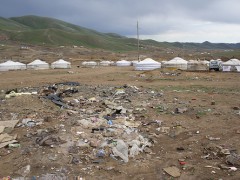-

Ninjas Threaten Way of Life in Mongolian Grasslands
“Ninja”–or artisan miners–in Mongolia are people who dig dirt, live like outlaws and seek gold on old/used mining fields. There are around 5000 such artisan miners working in Uyanga soum /village/ of Uvurkhangai aimag / province/ in Mongolia, today. It was rumored that ninjas were reducing in last few years […]
Read all posts from ‘Avoiding the resource curse’
-
The Quest for Colombian Gold
Colombia’s mining industry is trying to re-write its history. Can it turn paramilitary incursions, envorinmental chaos and land disputes into friendlier mining? Participating in the world economy with a highly strategical mineral and preserving the environment seem to be at odds with each other in Colombia . And issues like […]
-
The Political Economy of Oil and Gas in Southeast Asia: Heading Towards the Natural Resource Curse?
The notion of the resource curse suggests that countries with large caches of natural resources often perform worse in terms of economic growth, social development, and good governance than other countries with fewer resources. The theory posits that countries depending on oil or other extractive industries for their livelihood are […]
-
Resource Management and Transition in Central Asia, Azerbaijan, and Mongolia
The paper presents a comparative analysis of the resource-rich transition economies of Mongolia and the southern republics of the former Soviet Union. For Uzbekistan and Turkmenistan, the ability to earn revenue from cotton exports allowed them to avoid reform. Oil in Azerbaijan and Kazakhstan was associated with large-scale corruption, but […]
-
Development and Engagement in South America’s Resource Sector: Is China replicating the African Experience?
This paper compares the developmental dynamics entailed by China’s engagement in the South American and African extractive sectors. It argues that China’s growth and investment have strengthened the position of resource-endowed countries in the international economy, revitalizing resource industries and improving terms of trade for commodities. Concurrently, the expansion of […]
